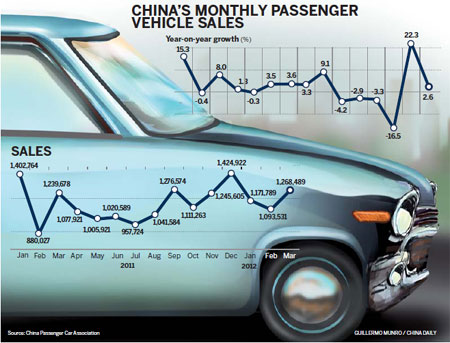 |
|
|
|
|||||||||||

Industry's monthly sales for March 2.6 percent more than previous year
First-quarter sales of passenger vehicles in China changed little from what they had been in the first three months of last year.
To many industry observers, that indicated the industry had returned to enjoying the sort of stable development that can be sustained over the long term.
The country saw sales of 3.53 million cars, sports-utility vehicles, multi-purpose vehicles and minivans from January to March, a number that was up by 0.3 percent from a year earlier, the China Passenger Car Association said on Tuesday.
The industry's monthly sales for March came to 1.27 million units, 2.6 percent more than in the previous year. Following a 16.5 percent year-on-year decline in January and a 22 percent year-on-year increase in February - both effects of the early advent of the Spring Festival holiday this year - the figure in March marked a recovery for the industry. Yet it still disappointed observers' expectations.
"The three-day holidays and the fuel price hike in the month pulled down the growth rate," said Rao Da, secretary-general of the association. "The record high fuel prices put a lot of pressure on Chinese buyers, who react quickly to price changes, and delayed their car purchase plans."
He said the increase in fuel prices will continue to influence vehicles sales in April, especially those of small and middle-size passenger vehicles and of Chinese automobile brands.
"However, April will see swarms of new models being introduced and the approaching Beijing auto show will attract consumers back to the showrooms and help vehicle sales increase slightly in the month," Rao said.
He predicted earlier this year that China's automobile market will increase by 7 percent to include 19.8 million units in 2012, 15.55 million of which will be passenger vehicles.
In 2011, the government suspended giving out subsidies meant to stimulate vehicle purchases. As a result, vehicle sales in the country slowed from their fast pace of previous years.
"Starting this year, China's automobile industry, without policy support, has been returning to its normal state," said Xu Changming, director with the State Information Center's information resource unit.
"The country's macro economy will be the major factor in the industry's sustainable development."
Shi Jianhua, deputy secretary of the China Association of Automobile Manufacturers, said China's economic policies promise to give the automobile industry a bright future. The potential for vehicle purchases in China's third- and fourth-tier cities is also expected to spur demand.
Shi said a slowing economy and the increasing cost of raw materials and of fuel prices will place more obstacles before the market. Yuan appreciation, as well as trade friction and barriers, are also expected to impede vehicle exports.
Compared with China, the United States, which lost its position as the largest market for vehicles to China three years ago, saw its market for vehicle sales recover in March. That month witnessed 1.4 million vehicles sold in the US, a 13 percent increase year-on-year, exhibiting the market's best performance since August 2007.
The US auto conglomerate General Motors and its joint ventures in China sold 257,944 vehicles in China in March and 745,152 vehicles in the first quarter of 2012. Those figures set records for both the month and the quarter.
Also in March, the company's domestic sales were up 10.7 percent from the same month in 2011. That was the second-biggest increase recorded in any month in GM's history in China.
For the first three months of the year, the company's domestic sales increased 8.7 percent, a bigger percentage rise than the company has recorded for any other quarter since it began doing business in China.
The company also saw its sales increase by 12 percent in its home market in March, when it delivered 231,000 vehicles.
The Japanese automaker Toyota Motor Corp's first-quarter sales in China increased by 1.8 percent year-on-year, while Honda Motor Co's sales declined by 10.6 percent in the first three months.
The US automaker Ford Motor Co reported a sales decline of 10.59 percent in March and 13.64 percent in the first quarter in the Chinese market. However, its business in the US jumped 5 percent over last year to 223,000 units in March, the highest monthly sales in five years.
lifangfang@chinadaily.com.cn